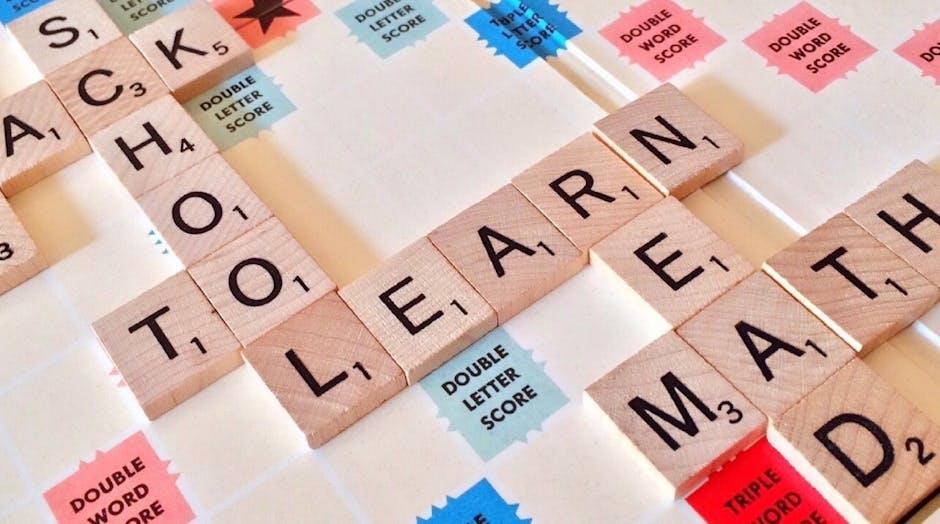Welcome to our collection of Year 1 English worksheets, designed to engage young learners in fun and structured activities․ These resources focus on building foundational skills in grammar, vocabulary, reading, and writing, while encouraging creativity and confidence․ Perfect for homeschooling or classroom use, our PDF formats are easy to download and print, making learning accessible and enjoyable for everyone․ Explore a variety of themed exercises to cater to different learning styles and interests, ensuring a strong foundation for future academic success․
1․1 Importance of Worksheets in Early Learning
Worksheets play a vital role in early learning by providing structured, interactive activities that develop essential skills․ They introduce foundational concepts like alphabet recognition, word arrangement, and simple sentences, fostering a strong academic base․ Worksheets also promote independent learning, allowing children to practice at their own pace while building confidence․ Engaging exercises, such as matching words to pictures or identifying animal sounds, make learning fun and memorable, setting the stage for future success․
1․2 Benefits of Using PDF Formats
PDF formats offer a convenient and accessible way to use Year 1 English worksheets․ They are easy to download, print, and share, ensuring consistent learning materials for all students․ PDFs maintain their formatting across devices, providing a clear and professional layout․ This makes them ideal for both classroom and homeschooling environments, allowing parents and teachers to deliver structured lessons effectively while preserving the quality of the content․

Grammar and Vocabulary Development
Engage children with interactive grammar and vocabulary exercises tailored for Year 1․ These activities focus on foundational skills, introducing basic sentence structures and word usage through fun, structured tasks․
2․1 Basic Sentence Structure
Our Year 1 English worksheets introduce simple sentence formation through engaging exercises․ Activities include arranging words to create complete sentences and matching words to pictures․ These tasks help children understand subject-verb agreement and word order․ Interactive exercises, like fill-in-the-blank and sentence scrambling, make learning fun and effective․ Students gain confidence in constructing clear, grammatically correct sentences, laying a solid foundation for future writing skills․ Regular practice reinforces these concepts, ensuring steady progress in language development․
2․2 Word Arrangement Exercises
Word arrangement exercises are essential for developing foundational language skills․ These activities involve rearranging jumbled words to form complete sentences, enhancing logical thinking and grammar understanding․ Interactive tasks, such as matching words to pictures, help students connect vocabulary with context․ Our PDF worksheets include engaging exercises like sentence scrambles and word sorting games, making learning fun and effective․ Regular practice improves sentence construction and vocabulary retention, preparing students for more complex writing tasks․ These exercises are designed to be visually appealing, with clear instructions and colorful illustrations to keep young learners engaged and motivated․ By mastering word arrangement, students build a strong foundation for future language development, ensuring they can communicate ideas clearly and creatively․

Reading Comprehension Activities
Engage students with interactive reading exercises, including matching words to pictures and simple story analysis․ These activities develop understanding, vocabulary, and critical thinking skills effectively․
3․1 Matching Words to Pictures
Matching words to pictures is a fun and interactive way to enhance vocabulary and reading skills․ Students identify and connect words with corresponding images, improving word recognition and comprehension․ These exercises often feature colorful visuals and simple, repetitive language, making them ideal for young learners․ Activities include identifying animals, objects, and actions, helping children build confidence in linking words to meanings․ This method also supports early spelling and pronunciation practice, laying a strong foundation for reading comprehension․
3․2 Simple Story Analysis
Simple story analysis activities introduce children to understanding narratives and identifying key elements like characters, settings, and basic plot sequences․ Worksheets often feature short, engaging stories followed by comprehension questions to assess understanding․ These exercises help develop critical thinking and vocabulary skills, encouraging children to interpret and reflect on the stories they read․ This foundational skill prepares them for more complex literary analysis in later years․
Writing Skills Enhancement
Year 1 English worksheets focus on developing foundational writing skills through structured activities, such as tracing letters, completing sentences, and creative prompts, fostering confidence and accuracy․
4․1 Alphabet Writing Practice
Engage your child with our Year 1 English worksheets, focusing on alphabet writing practice; These activities include tracing uppercase and lowercase letters, ensuring proper letter formation․ Guided lines help develop fine motor skills and hand-eye coordination․ Interactive exercises introduce letter-sound associations, laying the foundation for spelling and reading․ Downloadable PDFs are structured for easy printing, offering a fun and structured way to master the alphabet at home or in the classroom․
4․2 Creative Writing Prompts
Spark your child’s imagination with our creative writing prompts, designed for Year 1 students․ These engaging activities encourage storytelling, self-expression, and language exploration․ From describing a magical pet to writing about a seasonal event, these exercises help build confidence and creativity․ Simple and fun, they cater to young learners, fostering a love for writing while developing essential skills in a playful and interactive way․

Seasonal and Holiday-Themed Worksheets
Engage your child with seasonal and holiday-themed worksheets, featuring autumn activities and New Year’s Eve exercises․ These fun, interactive sheets make learning exciting and relevant to their world․
5․1 Autumn-themed Activities
Autumn-themed worksheets bring seasonal fun to learning, with activities like word searches, matching games, and creative writing about fall․ These exercises engage children with relatable topics, fostering vocabulary development and reading comprehension skills․ Interactive tasks, such as identifying autumn-related vocabulary and sequencing events, make learning enjoyable while building essential English skills․ Perfect for classroom or homeschooling use, these resources keep young learners excited about education during the autumn season․
5․2 New Year’s Eve Exercises
New Year’s Eve-themed worksheets offer engaging activities to celebrate the holiday while learning․ These exercises include word searches, counting games, and creative writing prompts about resolutions․ Children can practice vocabulary related to celebrations, such as “party hats” and “fireworks,” while developing reading and writing skills․ Interactive tasks, like sequencing events or matching words to pictures, make learning fun and culturally relevant for young students․

Downloadable Resources
Access free PDF worksheets and printable activity booklets designed for Year 1 English․ These resources include word searches, alphabet writing exercises, and sentence-building activities for young learners․
6;1 Free PDF Worksheets
Our free PDF worksheets for Year 1 English offer a variety of engaging activities, including word searches, alphabet tracing, and sentence-building exercises․ Designed for homeschooling or classroom use, these resources cover grammar, vocabulary, reading, and writing skills․ Seasonal themes, like autumn and New Year’s, add fun and relevance․ Each worksheet is carefully crafted to support young learners in developing foundational English skills in an enjoyable and structured way․
6․2 Printable Activity Booklets
Our printable activity booklets for Year 1 English are comprehensive resources packed with engaging exercises․ Each booklet covers key skills like reading, writing, and grammar through themed activities․ Seasonal booklets, such as autumn-themed exercises, add variety and relevance․ Ideal for homeschooling or classroom use, these booklets offer a structured approach to learning, ensuring fun and educational experiences for young learners․ They are perfect for fostering creativity and confidence in early education․

Assessment and Progress Tracking
Track your child’s progress with answer keys and feedback sheets․ Monitor development through structured assessments and progress monitoring tools, ensuring steady improvement in English skills over time․
7․1 Answer Key and Feedback
Each worksheet includes a detailed answer key, providing correct responses for all exercises․ This helps parents and teachers assess progress accurately․ Feedback sections offer insights into common mistakes, allowing for targeted improvement․ Clear explanations and correction tips guide learners to understand errors and master concepts effectively․ These resources ensure comprehensive understanding and skill development in young students․ Downloadable PDFs make it easy to access and utilize these tools for consistent learning support․
7․2 Progress Monitoring Sheets
Progress monitoring sheets are essential tools for tracking students’ development in Year 1 English․ These sheets provide a clear record of improvement over time, highlighting strengths and areas needing attention․ Designed for teachers and parents, they include space for notes and specific skill assessments․ Regular use helps identify learning patterns and supports tailored instruction․ Downloadable PDF formats ensure easy access and consistent progress tracking throughout the year․

Interactive and Fun Activities
Engage Year 1 students with interactive quizzes, puzzles, and word games that make learning English enjoyable․ These activities promote skill development through playful and dynamic exercises, fostering creativity and enthusiasm in young learners․
8․1 Quizzes and Puzzles
Engage Year 1 students with exciting quizzes and puzzles that make learning English fun․ These activities include word-based exercises, matching games, and simple crosswords․ Designed to reinforce vocabulary, spelling, and comprehension skills, they provide an interactive way to practice language basics․ Seasonal themes add variety, keeping children motivated and eager to learn through playful challenges․ Ideal for both classroom and home use, these resources foster a love for learning while building confidence in young learners․
8․2 Word Games and Matching Exercises
Make learning interactive with word games and matching exercises tailored for Year 1 students․ These activities include matching words to pictures, arranging letters to form simple words, and solving basic word searches․ Designed to improve vocabulary and spelling, they also enhance problem-solving skills․ Seasonal-themed games add fun, while downloadable PDFs and printable booklets ensure easy access to engaging practice materials for young learners․

Additional Resources
9․1 Flashcards and ABC Books
Enhance learning with flashcards and ABC books, designed to reinforce vocabulary and alphabet skills through interactive and visually engaging activities for young students․
Flashcards and ABC books are essential tools for early learning, helping students recognize and memorize letters, sounds, and basic vocabulary․ These resources often feature colorful designs and interactive elements to engage young learners․ Flashcards can be used for quick recall exercises, while ABC books provide a structured approach to learning the alphabet․ They complement worksheets by offering hands-on activities that make learning fun and accessible for Year 1 students․
9․2 Lesson Plans and Teacher Guides
Lesson plans and teacher guides provide structured approaches to teaching Year 1 English, offering detailed instructions for activities and assessments․ These resources include sample schedules, activity ideas, and answer keys, ensuring educators can deliver effective lessons․ They often align with curriculum goals, making it easier to track student progress and adapt instruction to meet diverse learning needs, supporting both teachers and students in achieving academic success․